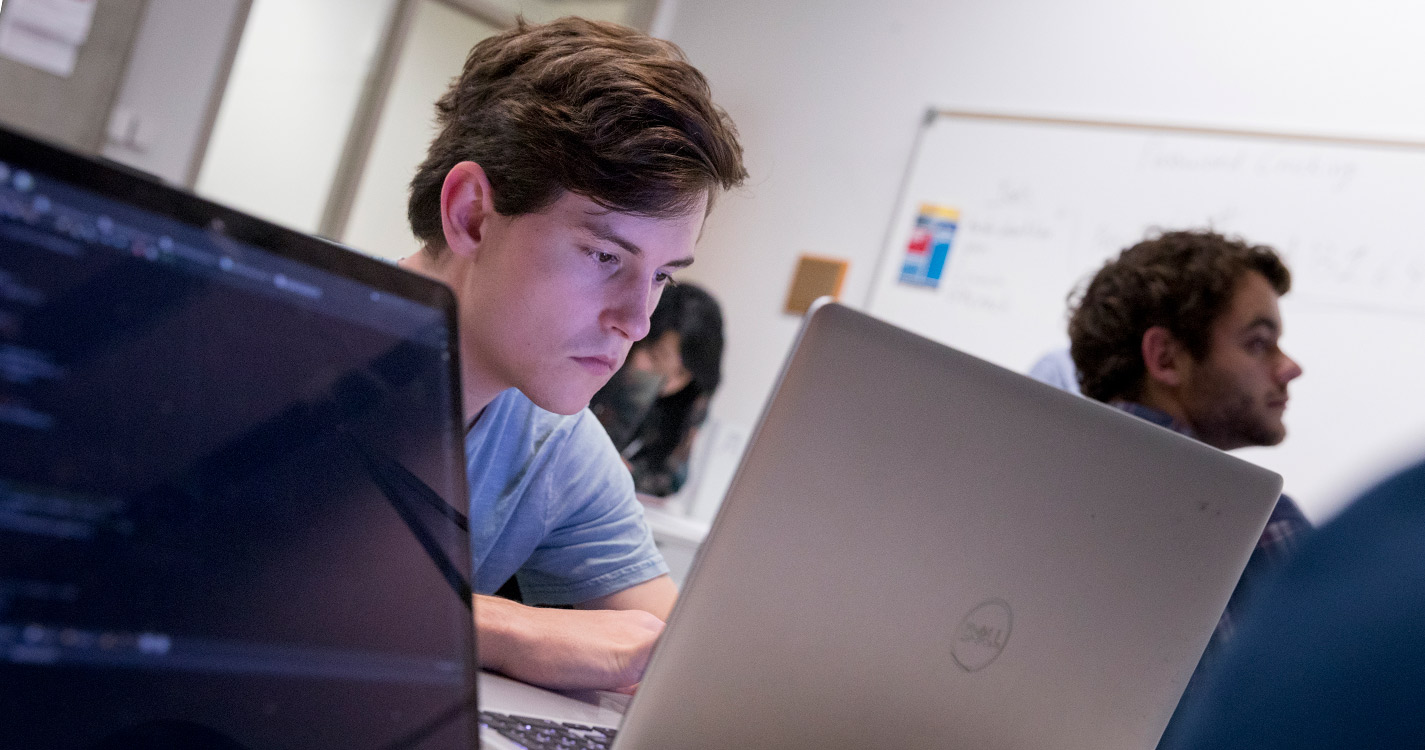Two years after Russian interference in the presidential election, U.S. voting machines are still vulnerable to attacks. That’s why Sophia Anderson ’19 believes an education about cybersecurity is more important than ever.
Anderson, a computer science major, read in September about a hacking conference where participants legally hacked into voting equipment and replicas of election result websites for research. An 11-year-old changed the vote totals on a site for Florida in less than 10 minutes, illustrating how vulnerable the websites, databases and machines really are in the face of Russian interference, Anderson said.
“Understanding the infrastructure behind security is so important,” she said.
The topic should be taught more in higher education, too, she said. Serious about her interest, Anderson co-founded the Student (Cyber) Security League in 2015 with Wren Andrus ’19 and Jamie Leary ’19 as an informal gathering. Dubbed SSL for short — a networking pun — the club has now become a complement to Willamette’s computer science programming.
Club competition
In the club, students learn everything from protecting information through the use of codes to simulating a cyberattack with one major goal in mind: to compete at the National Cyber League (NCL).
Hundreds of hackers from colleges across the nation meet once per semester for the competition. The challenges they complete cover a wide range of cybersecurity topics and skill levels based on Certified Ethical Hacker Certification exams. Similar to the game “capture the flag,” they search for 12-digit “flags” comprised of several numbers and letters hidden in data or images.
Competitors are given 72 hours to finish — some go straight through — and collaboration is not allowed. During the season, Willamette students gather in Ford “both for hacker solidarity and so that we don't all hole up in our dorms alone for 72 hours,” Anderson said.
Once they finish an individual competition, they earn a reward that goes beyond bragging rights: a personalized scouting report that some cybersecurity employers view as further proof of their abilities. In 2017, Alden Vanderspek ’18, Leary and Andrus ranked 2nd, 4th and 17th nationally overall, so within the top 1 percent and top one-tenth of one percent of more than 2,000 NCL players that season.
While the club is intended primarily as a learning experience, students feel they need the club “because we do not have enough people (nationwide) interested and trained in cybersecurity,” Anderson said.
Club adviser Associate Professor of Computer Science Fritz Ruehr, who introduced students to the NCL, supports that statement. Before attending a CREST workshop in 2017, which was funded by the federal government to improve faculty expertise in cybersecurity, he noticed something strange. Instead of being charged an expensive registration fee, the organization offered $1,000 per day for people to attend.
“It was very clear that at the federal level, they were willing to spend millions because they are scared witless,” he said. “At the workshop, they spent several hours convincing us that cybersecurity is a huge national issue that could go wrong at any moment in a horrifying way.”
Future careers
The career is also a lucrative one.
A projected 3.5 million cybersecurity jobs will be unfilled by 2021. Anderson plans on pursuing this career path after she graduates, like Vanderspek, who now works at digital entertainment giant Electronic Arts.
Anderson said, “I've always liked finding loopholes in rules and such to the dismay of my teachers sometimes. I love knowing the details of how things work. Cybersecurity is a really good combination of the two once you really get into it.”
Ruehr said anyone interested in the topic should join SSL. New students are welcome at any point. The curriculum is designed to be accessible for all knowledge levels. A few NCL student veterans, including Anderson, wrote and developed the curriculum at the heart of the club.
The best part of is watching students grow in confidence and technical knowledge, Ruehr said. Experience in this field “opens up tremendous futures for them.”
How to get involved:
Student (Cyber) Security League meets at 8 p.m. every Wednesday in Ford 222. Contact Sophia Anderson for more details at scanderson@willamette.edu.


